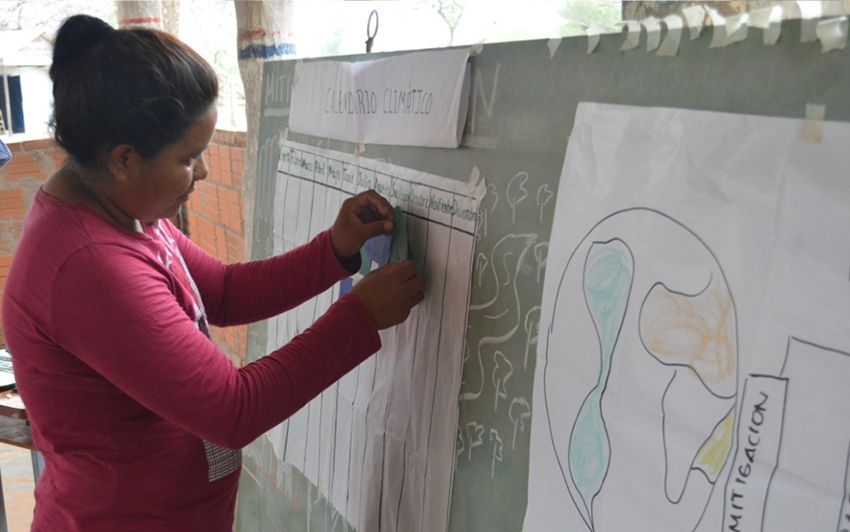Representatives of indigenous peoples and governments of Latin America and the Caribbean are participating in the COP25 that is taking place in Madrid, December 2-13, 2019.
The project "Participatory Environmental Governance: integrating the challenges of climate change in the Gran Chaco Americano", part of the Forests, Biodiversity and Ecosystems component of the European Union-funded EUROCLIMA+ programme, is participating in the COP25 side event “Strengthening the rights and participation of indigenous peoples in actions to combat climate change: A Latin American and Caribbean perspective”, on 7 December.
The event aims to bring together representatives of indigenous peoples and governments of Latin America and the Caribbean (LAC), as well as experts from international organisations to exchange experiences, practices and case studies.
The dialogue will allow reflection on how indigenous communities can better participate in decision making that will help complete the Nationally Determined Contributions.
During the event, the experience with Local Adaptation Plans in four municipalities of the Paraguayan Chaco (Filadelfia, Loma Plata, Irala Fernández and Mariscal Estigarribia), will be presented by Mrs. Jorgelina Rolón and Mr. Cecilio López, President of the Association of Municipalities of the Central Chaco.
The biodiversity of the Gran Chaco
The Gran Chaco is a region that was recently integrated into the respective States, whose population and cultural diversity of indigenous peoples, farmers, foreign and local migrants is slowly being incorporated into national economies and dynamics
In taking on high biological and cultural diversity, we find demographic and infrastructure growth that intensifies normal production processes and increase the demand for natural resources, putting at risk their sustainability in the medium and long term. This has resulted in major negative environmental impacts, which have been generated by changes in land use, scarcity of water for consumption and production, coupled with inadequate management of surface and groundwater sources.
In order to face this problem and the peculiar characteristics that accompany it, the “Participatory Environmental Governance” project aims to ensure that the main people affected - farmers and indigenous people - have their own environmental and cultural reserves, and exploit tourism, agroecology and handicrafts in a sustainable manner.
In addition to strengthening traditional practices that ensure food security, there is a high level of support from the local governments involved, which allows funds to be channelled while making public policies for the populations most exposed to climate change.
Situation of the indigenous population in Paraguay
According to data from the III National Census of Indigenous Peoples 2012, the indigenous population in Paraguay consists of 115,944 people (approximately 2% of the country’s total population) and they live in 13 departments of the Eastern region, the Chaco, and the city of Asunción. The Official Indigenous Census identifies 19 indigenous peoples belonging to five linguistic families: guaraní (aché, avá guaraní, mbya guaraní, paï tavytera, guaraní ñandeva, guaraní occidental), maskoy (toba maskoy, enlhet norte, enxet sur, sanapaná, angaité, guaná), mataco mataguayo (nivaclé, maká, manjui), zambuco (ayoreo, yvytoso, tomáraho) and guaicurú (qom). They live in 493 communities and 218 villages or neighbourhoods, making a total of 711 entities.
The Paraguayan Chaco is where the greatest number of indigenous people are concentrated, therefore, it has the highest diversity of peoples, with their respective cultures and languages. These include: Nivaclé, Ayoreo, Enxet, Enhlet, Guaraní Ñandeva, Guaraní Occidental, Qom, Maká, Yshir, Guaná, Tomaraho, Manjui. In the Western region, the departments of Presidente Hayes and Boquerón have the highest number of communities, with 50 and 46 (10.1% and 9.3%), respectively.
The challenges assumed by the project “Participatory Environmental Governance” are the conservation of healthy and functional ecosystems for human settlements resilient to the impacts generated by climate change, oriented towards a creative economy and a participatory environmental governance system with local governments for public policies on forests, biodiversity and the Chaco ecosystem.
Other data
- The “Participatory Environmental Governance” project is implemented by a consortium of organisations made up of the NGO Mingará, the Plurales Foundation, Gestión Ambiental (GeAM), Unión Iberoamericana de Municipalistas (UIM) and the Municipality of Filadelfia.
- The local governments of Filadelfia, Loma Plata, Irala Fernández and Mariscal Estigarribia in Paraguay are promoting inter-institutional roundtables as a sphere of articulation and synergies to complement local, national and regional actions in finding solutions to the severe environmental and social problems (deforestation, desertification, poverty) that exist.
- The Filadelfia Inter-Institutional Board (MIDIF) and the Mariscal Estigarribia Inter-Institutional Board for Integral Development (MIDIMEC) are current efforts working with indigenous communities in the region. The Association of Municipalities of the Central Chaco is also a space for coordination among all sectors.
- For more information about the project: https://www.euroclima.org/proyectos-bosques/gobernanza-ambiental-participativa
About EUROCLIMA+
EUROCLIMA+ is a programme funded by the European Union and co-financed by the federal government of Germany as well as the governments of France and Spain to promote environmentally sustainable and climate-resilient development in 18 Latin American countries, particularly for the benefit of the most vulnerable populations. The Programme is implemented under the synergistic work of seven agencies: Spanish Agency for International Development Cooperation (AECID), French Development Agency (AFD), Economic Commission for Latin America and the Caribbean (ECLAC), Expertise France (EF), International and Ibero-American Foundation for Administration and Public Policies (FIIAPP), the German society for international cooperation (GIZ), and UN Environment.
Contacts
Press: Maite Cigarán (This email address is being protected from spambots. You need JavaScript enabled to view it. )
To participate in the event during COP25: Fabián Villanueva (This email address is being protected from spambots. You need JavaScript enabled to view it. )




